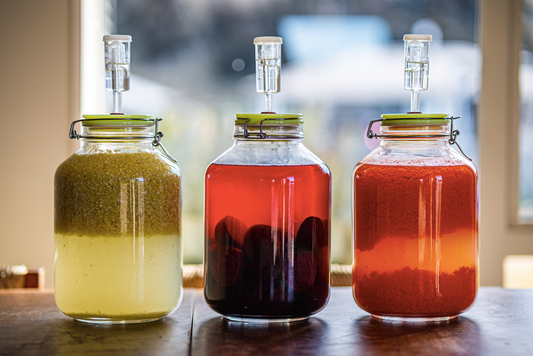Get ready for a deep dive into the world of psoriasis, skin & autoimmune conditions and how research is shaping our understanding of the major role our gut plays in maintaining and treating our skin.
Before we dive deep into this - a little backstory
Since we started Clover Ferments, we have been so privileged to have received such genuine feedback and stories of our incredible clients and their ongoing health journeys.
Ultimately, we researched, understood and experienced first-hand the positive impact that Kvas has on developing the gut microbiome, and the positive flow-on effects on the immune system, brain, (mood, energy levels, focus to name a few), and as a natural treatment for addressing leaky gut syndrome.
However, the one area we have received the most positive feedback from our tonics has been from psoriasis sufferers that have bravely shared their skin journey with us. This was a massive lightbulb moment for me, as I was aware of the gut-skin connection but wanted to further research and understand the biological processes in play and how this ties into autoimmunity issues as a whole.
This blog isn’t about how incredible Clover Ferments is for psoriasis sufferers - although we will be sharing some of the brave stories we have had shared with us. Instead, get ready for a deep dive into the world of psoriasis and autoimmune conditions and how research is changing and developing our understanding and approach to treatment.
Psoriasis: In a nutshell
If you or one of your nearest and dearest suffers from psoriasis, you will be familiar with the ongoing cycle of symptoms - dry, flaking skin, often accompanied by itching and pain as the skin repeatedly cracks in certain areas. You’ll also be familiar with the various phases of healing and shedding.

For some individuals, the issues can present as rather mild and only in isolated patches- but even this can create issues that go further than the physical, with many sufferers fearful that others will see the rash as contagious- which it 100 percent isn’t.
This already demonstrates the glaring gaps of understanding we have when it comes to skin conditions like psoriasis.
For others, the pain and symptoms are more severe and may be accompanied by arthritis (known as psoriatic arthritis), which causes progressive damage to the joints and often requires medications and management by a rheumatologist to prevent irreversible joint destruction.
What exactly is psoriasis?
Psoriasis is categorised as an autoimmune disease, which causes the body’s immune system to become dysregulated and react and attack normal proteins in the body - like they are a toxic threat.
Autoimmune diseases unfortunately don’t often make an appearance on their own - and psoriasis is no different. Psoriasis sufferers have approximately twice the risk of a normal population to have two other autoimmune diseases (such as coeliac & irritable bowel syndromes) and are about 3.5 times more likely to develop or have rheumatoid arthritis.
Looking at the causes
In a nutshell: the medical community is still unclear about the exact causes of psoriasis.
However, thanks to decades of research, they have a general idea of two key contributing factors: genetics and the immune system. There are many ways the gut microbiome may be connected with a variety of autoimmune diseases, and the growing accumulation of research on the topic has been able to showcase the gut's role in causing autoimmune conditions such as psoriasis.
A recent study by Harvard Medical School in 2021 looked at the connection between the gut and psoriasis and it was found that 85.53% of psoriatic patients presented at least one gastrointestinal symptom such as abdominal distention, constipation, and other bowel and gastro issues).
Further to the earlier point about autoimmune conditions rarely being standalone, there has been an established link between celiac disease or gluten sensitivity and psoriasis. When you have celiac disease, you can't digest gluten, a protein in wheat, rye, and barley.

Celiac disease can damage your small intestine and prevent it from absorbing key nutrients. The chance of getting celiac disease is nearly 3 times higher among people with psoriasis. Research shows that the higher the levels of specific antibodies related to celiac disease, the worse psoriasis tends to be.
A study published in December 2018 in the journal Clinical and Experimental Dermatology further confirmed this link and found that more than a third of the study participants with psoriasis had elevated antibodies to gliadin (gluten) in their blood.
Whilst celiac is not always present in psoraisis sufferers, it is quite often one of the underlying links and can contribute to developing conditions such as Leaky Gut Syndrome.
It has also been observed in some more recent studies that people with psoriasis have:
- A different range of gut bacteria when compared to those that aren’t suffering from psoriasis or an associated skin condition.
- Lower numbers of many intestinal bacteria which are thought to be beneficial to health
- Reduced signs of inflammation when given a specific probiotic
There are many possible triggers of psoriasis and the reasons why it flares in some people at any given time. As we know- it’s important to remember that every person, their body, and how their body reacts are different. Infection, injury, medication, diet, alcohol, smoking and hormonal changes are all known triggers. It is also accepted that stress can both trigger psoriasis and make existing psoriasis worse.
Where does the gut-skin connection come into play?
As we have explored, the link between digestive issues and psoriasis has been researched in detail, and leaky gut syndrome is one of the most common links. Psoriasis is associated with low levels of gastrointestinal bacteria that are known to be beneficial to the guts microbiome.
A lack of helpful gut bacteria can lead to an overgrowth of bad bacteria, and when this happens, the gut walls start to become damaged. This damage is more commonly known as leaky-gut syndrome.
Leaky-gut syndrome is when the contents of the gut are able to pass through the cell walls and into the bloodstream. Molecules of food, bacteria and parasites are able to pass into the bloodstream where they can trigger a host of problems throughout other parts of the body- and trigger an immune response.
Many autoimmune conditions, as well as skin conditions, are triggered by having leaky gut.

While harmful gut bacteria is usually the leading cause, the likes of alcohol, gluten, dairy, food additives, and pesticides can also contribute to damaging the gut wall too. When these harmful substances make their way into the bloodstream the body looks for the quickest way to remove them, and through the skin is one such way.
The body triggers an immune reaction in response to these substances, which can cause redness and swelling and conditions like psoriasis.
What can I do?
Getting yourself assessed by a practitioner that can look at your balance of gut bacteria - including the presence of parasites, any bacteria imbalance as well as leaky gut is the key first step. From here an appropriate gut treatment and restoration plan can help improve inflammation, and immune system responses, and ultimately support the body in healing from psoriasis and other skin conditions.
However, it is incredibly important you find a healthcare provider that can guide you through the treatment and restoration process, which include the likes of

- Core dietary changes generally start by eliminating a range of inflammatory foods. These changes need to be advised and monitored correctly and tailored to your specific needs and adjusted as you progress and heal.
- Supplementation is also considered a vital part of healing the gut and directly improving psoriasis. The likes of Vitamin A, vitamin D and long-chain omega-3 fatty acids all have roles in gut health
- Essential fatty acids such as eicosapentaenoic acid (EPA), docosahexaenoic acid (DHA), and gamma-linolenic acid (GLA) can reduce inflammation within the body and have been shown to improve symptoms of psoriasis including reducing the number of lesions, erythema, and scaling.
- And of course- fermented foods and probiotic drinks, which contain live ‘good’ bacteria. If these bacteria are able to survive the PH levels of the stomach and small intestine (quite often they won’t in the initial stages of gut healing, where there is an overwhelming imbalance) the bacteria travel to the large intestine where they become established and work their magic!
A recent review examined evidence from 19 studies to assess the effect of fermented foods on the human gut microbiota where promising findings were reported. This brings us to our own personal stories of hope from Clover Ferments
Our Stories of Hope
One of the most incredible aspects of our journey with Clover Ferments has been hearing the stories from our incredible clients and how our tonics have enabled them to experience major positive changes - in particular in their skin. We are stoked to share some these journeys below, with permission, and call them our stories of hope.
“Since starting Clover Ferments I have noticed a huge difference in the redness, swelling and itchiness of my hand dermatitis. I still experience some dryness but no more cracked or bleeding hand!”
-Jorgia
My daughter has a chronic autoimmune illness as well as psoriasis. Within a few days of starting the ferments some of her psoriasis lesions started to heal!
- Marguerite
Shelby’s Incredible Journey
“I started taking Clover ferments in November 2021 after being on all kinds of steroid and immune suppressing medications for nearly 3 years for psoriasis. I found Clover Ferments on Instagram 3 weeks after I had an appointment through the local DHB whom all could offer was more immune suppressing medication, I knew I didn’t want to continue on with the heavy medication, after being told there was no hope unless I was on the medications I took it upon myself to find something to help me heal.”

After using our tonics consistently for 4 weeks
“I had seen clover pop up a few times so looked into what they did. Did a little research and few things aligned so thought what have I got to loose and WOW, at first I was very iffy of the taste (I’ve got very fussing taste buds) but chugged them back and after 3 weeks I started to see big changes in my skin, so I kept at them, I personally mix all 3 together and break my fast in the afternoon with the mix, always feeling that wholesome energy kick after 20mins.
I’m still taking Clover Ferments everyday and seeing great results in my skin but also big changes in bloating, moods and energy levels. Healing my gut health to heal my psoriasis was the 2nd best thing I did, healing my gut health with clover ferments was the BEST thing I did! The changes I have personally experienced from taking clover ferments have been life changing
For me, now my body’s not 80% covered in psoriasis and I can keep living my life like I used to before psoriasis tried to take over.”!




